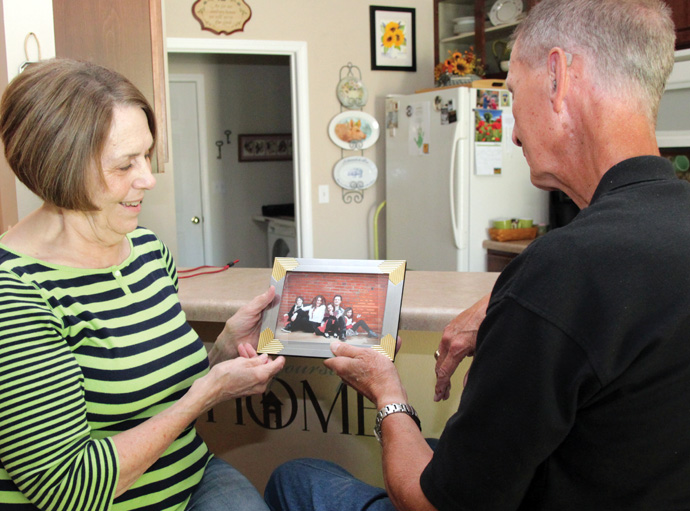When Molly Olson was growing up, going to St. Clare School in O’Fallon, learning her faith in a warm and loving family, who knew she would become caught by compassion and a determination to respond and to act for victims of human sexual trafficking, giving voice to a tragedy engulfing young people around the world and here in our midst in the Midwest?
It was her gift of writing, of not just stringing words together but crafting them into “story” that is making a real difference in the lives of the young, the vulnerable, those who have been enslaved and trafficked against their wills.
Writing “Caged,” and then “Caged No More,” then the screen play for the movie were not enough for Molly Olson Venzke, daughter of the Midwest and mother of three girls, now living with her husband, Jay, near Seattle, Wash. Ghost-writing books, she began research on human sex trafficking and then felt compelled to do something.
“Since I was a writer, I decided to use that gift to create a novel that could be used as a fund raiser for Trafficking Hope, an anti-trafficking organization dedicated to both spreading awareness about sex trafficking in America and rescuing and restoring its victims,” Venzke said.
While the movie is fictional, as are the characters, Venzke’s research gave her the tools to create those characters from the real people she met while doing research on human sex trafficking.
In addition to her writing, Venzke also teaches and speaks against trafficking in her home area, her church and in other communities like O’Fallon where she returned in May to talk about trafficking at her alma mater and screen her movie.
Deacon Richard and Jan Olson, her parents, couldn’t be prouder of their daughter. They knew, even as a child, Molly was destined for something special, they just didn’t know what that “something” would be.
“She’s outgoing,” the deacon said. As a fifth-grader at Cathedral Grade School, “Molly would walk up and down the aisles in Celeste Cocheba’s class,” discussing whatever material was that day’s lesson.
With her siblings, the Olson children put on plays and charged a dime to the neighbors to attend, her parents said. And they came.
As she wrote her first book, her parents became long distance proof readers for her. “She is trying to raise awareness about this issue,” Jan Olson said. “That’s her passion.”
To live a “passion” takes sacrifice, and “Molly has sacrificed,” Jan Olson said. “She’s a mom, not star-struck.” For Molly, this passion moves from the inside out, a godliness that pushes her to respond, to actively pursue this dream, this hope that awareness can give birth to action.
“I do believe God lives inside of us, expresses itself in giving,” Venzke said. “When we hear about it (sex trafficking), our first inclination is to do something to help, and it’s through this spirit of God.” Venzke believes that when “people find out about it, the heart cries out to do something.”
Her definition of compassion is anything but passive. Here’s how she describes the role of anyone whose eyes have been opened to the facts.
“It’s time we all open our eyes and truly see, even if it’s inconvenient. It’s time to take action, even if it seems irrational. Because the truth is this: millions of victims are being forced to exist in lives that are not their own. Right now. Even in America. They have lost their voice to cry out for themselves, and so we must use ours to scream from the rooftops, ‘No More!’ Because to remain quiet, now that we know the truth, would be irresponsible.”
In talking about why she speaks clearly, passionately about human sex trafficking, Venzke said: “People think compassion is feeling bad about something,” but it’s much more than that.
Looking to the story of the Good Samaritan, Venzke said: “The Good Samaritan paid a price — he sacrificed his time.” The others probably felt bad about the man lying on the side of the road, but they didn’t do anything, she said.
“Compassion gets messy; hope inspires people to not just feel something but to cross the street” and do something.
Venzke’s next move is to start movements in schools — Students Against Trafficking, and she hopes to have information available in the fall as the school year begins.
“I want STAT to be a national movement,” she said. Working with the organization, Trafficking Hope, “we want something students can be involved in, something at school.”
Because most teachers and students don’t know enough about the topic, she hopes to provide the tools for campus organizations to learn and act against human sex trafficking.
Human sex trafficking is often portrayed as a problem in other countries, or at least along the borders but not in the Midwest. That would be a myth.
In her presentations to schools when she was at home in May, she said: “Sex trafficking is huge in St. Louis. It’s one of the top five cities in America.” While this may seem hard to believe, major highways converge in St. Louis, and according to Venzke, “Highways are important to sex traffickers” so they can move the victims around.
With an estimated 27 million people enslaved and trafficked worldwide, Venzke’s definition of compassion — crossing the road and taking action — makes perfect sense.
“Caged No More,” rated PG-13, became available June 7 on DVD. To find out more about the movie and the issue of human sex trafficking, send Venzke an email at [email protected]







